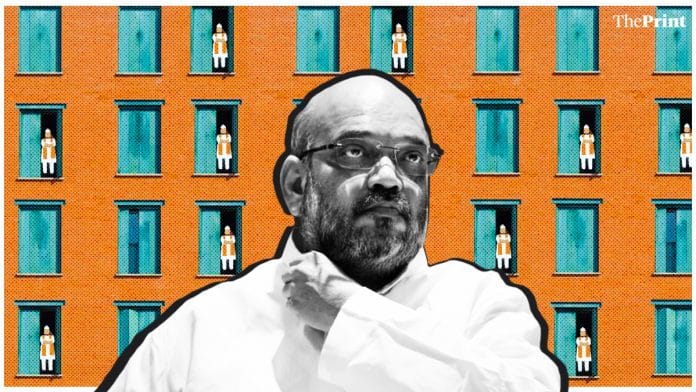Home Minister Amit Shah took a dig at the opposition in Maharashtra Monday saying that “if the BJP opens its door completely, except Sharad Pawar and Prithviraj Chavan, no one will remain in their respective parties”. In the last three months, more than 100 opposition members have defected to the BJP, including in Sikkim, West Bengal, Uttar Pradesh, Goa and Assam.
ThePrint asks: Will Amit Shah’s open-door policy lead to ‘Congressisation’ of the BJP?
People may come and go but BJP will not compromise its core ideology – Hindutva & Antyodaya
 Swadesh Singh
Swadesh Singh
Assistant professor, Delhi University
Amit Shah’s comment at Solapur was meant as a jibe. He was speaking at a rally in the home turf of Congress heavyweight Sushil Kumar Shinde, and in saying this he was holding the mirror to those parties that have got weaker and weaker in the last decade.
If we were to still stretch the hypothesis and consider the scenario where all senior leaders of the Congress and the NCP join the BJP in Maharashtra or any other state, even then the BJP will not become like the Congress. It is because the Congress party stands for three things today: dynasty, appeasement and corruption. The BJP, on the other hand, stands for nationalism, security and good governance, with its core values and politics still firmly rooted in the philosophies of Hindutva and Antyodaya.
Anyone who joins the BJP will have to follow these two cardinal principles of the party – you can see its manifestation in issues like the Ram Mandir, the Uniform Civil Code, and Article 370. Last month saw the abrogation of Article 370, hearing in Ayodhya’s Ram Mandir case is ongoing in a fast-track court, and the law to ban triple talaq has also been passed. These are proof of BJP’s commitment to its core ideology. These decisions have come at a time when many of the party’s top ministers, MPs, MLAs and even party office-bearers are not old RSS-ABVP activists. The message is clear — people may come and go but the BJP will not compromise its ideology.
Finally, what works for the BJP is the ideological mentoring and backing it gets from the RSS –its conscience keeper. On the other hand, the Congress has the backing of the Gandhi family.
Also read: How Amit Shah has ruined the party for Yediyurappa and BJP in Karnataka
BJP faces the danger of alienating its own leaders, and this would be the closest to ‘Congressisation’ of the party
 Sanjay Kumar
Sanjay Kumar
Director, Centre for the Study of Developing Societies
People are free to join and leave political parties. Most political parties welcome leaders from other parties without looking at their past credentials. In this regard, it is justified for the BJP to welcome all those who wish to join it irrespective of whether they are defecting from the Congress or from any other political party.
At a time when the BJP is being seen as different from others, Amit Shah’s open-door policy is creating a somewhat negative image of his party. The popular saying by BJP’s critics is that the party is like the Ganga. As everything becomes sacred once it is washed with Ganga’s water, the thinking is that these days every leader becomes clean after joining the BJP regardless of the image he or she may have carried.
In spite of all of these perceptions and defections, I would still hesitate to say that this would result in the ‘Congressisation’ of the BJP. There still remains a big difference between the BJP and the Congress. The BJP is headed by a very strong leader who commands absolute authority and respect, and the ideological commitments of most BJP leaders are much stronger than those of Congress leaders. We should not forget that the RSS is the guiding light to the BJP. So, even if a few leaders from the Congress join a big party like the BJP, it would just be a few drops in the ocean – it would make no difference to the ocean itself.
However, by accepting other leaders, the BJP faces the danger of alienating its own leaders who have worked for the party for many years. This might affect the morale of the BJP and this would be closest to the ‘Congressisation’ of the BJP.
Also read: AAP to contest Maharashtra polls, says time for opposition to stand up to BJP-Shiv Sena
Congress under Indira Gandhi also accepted opposition leaders. It gave electoral benefits at first, but later led to its decline
 Rahul Verma
Rahul Verma
Fellow at Centre for Policy Research
Politicians are power seekers first. They are in the business to make gains by holding office and are willing to defect to another party to ensure their political survival. So, it is very natural for any dominant party, like the BJP currently, to attract politicians across party lines. However, there is no clear answer to what will be the outcome of this open-door policy. On one hand, the BJP may face a big challenge soon. Politicians from other parties joining it can possibly lead to the dilution of the BJP’s ideological project. If the defectors are given a preference due to their winnability factor, it may also hurt the chances of BJP old-timers vying for tickets or trying to move up the organisational ladder. This may lead to rebellion within the BJP’s rank and file.
On the other hand, this open-door policy can also lead to the electoral strengthening of the BJP and the further weakening of the opposition. And this may force all rebellious elements within the BJP to toe the line of the party’s high command. As long as the party remains in a winning position, and its ideology not diluted, BJP and RSS’ vanguards will be happy to work with power-seekers defecting from other political parties.
History tells us that the Congress party in the 1970s under Indira Gandhi pursued a very similar strategy. At that time, many opposition leaders joined the Congress, which gave an electoral advantage to the party in the short-run, but eventually led to its ideological and organisational decline. The same could happen to the BJP, but what is unknown at the moment is whether the defectors will enjoy similar privileges and positions within the party as they had in the Congress back in the 1970s.
Amit Shah doesn’t want to ‘Congressise’ the BJP, he wants to destroy the very core of the grand old party
 Manisha Priyam
Manisha Priyam
Political analyst, researcher and academic
Home Minister Amit Shah’s open-door comment hints at the destruction of the very foundations of the Indian National Congress. And while this may be regarded as the ‘Congressisation’ of the BJP in some ways, it is more of a political move — to destroy the Congress party and its dynastic structure altogether.
In some states, such as Maharashtra, the Congress has had strong roots and a fairly strong foundation. Its previous alliances with the NCP meant that it had access to money in ways that were not ordinarily possible to accumulate in any other state. So, this open-door policy of the BJP is a political strategy to continue the destruction of the Congress. I also hesitate to call it the ‘Congressisation’ of the BJP because this policy not only affects the Congress but every other principal opposition party in a state. The BJP is strengthening its political roots.
Many people are also leaving the Congress because its workers are fairly underconfident of the party’s leadership in terms of being able to put up a tough fight against PM Narendra Modi and Amit Shah. More the lack of confidence among a party’s leaders, stronger is the will to leave the party.
Amit Shah’s open-door policy may or may not lead to ‘Congressisation’ of BJP, but will hollow out Congress
 Shivam Vij
Shivam Vij
Contributing editor, ThePrint
Amit Shah’s open-door policy to welcome anyone and everyone within the party’s fold may or may not lead to the ‘Congressisation’ of the BJP, but it will definitely hollow out the Congress. This perhaps is the very aim of the BJP. The idea is to have a one-party State where every political leader is in the BJP and the opposition doesn’t exist.
The BJP has long not been a party with a difference. It is already like the Congress under Indira Gandhi. Politicians big and small can all join the BJP, right from Ladakh to Lakshadweep, but the party stays afloat in the name of Prime Minister Narendra Modi. Amit Shah wants to change this and be a mass leader in his own right. He might well succeed, who knows? But if Modi were to be followed by another popular national mass leader, all these hordes of party workers and local leaders might switch to the party of that leader.
The BJP says it is the ever-expanding world’s largest political party. Having mainstreamed Hindutva, it seeks to bring the party within national mainstream, and to that extent, establish a big tent under which everyone is welcome. That is how the Congress party once was, a secular tent that worked through a coalition of social and ideological extremes.
By Taran Deol and Revathi Krishnan







One is unqualified to judge the political consequences, although there is less difference between political parties, notably once they are in power, than they might claim. What should be very high on the agenda, though, is to bring in people of proven governance acumen. The talent crunch continues into the second term. Consider the challenge of unlocking India’s demographic dividend and the required caliber of the Minister who helms HRD. Or the all but declared economic crisis India faces and the need for a C D Deshmukh like figure.